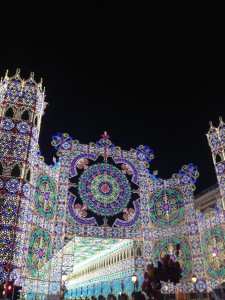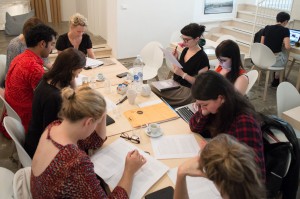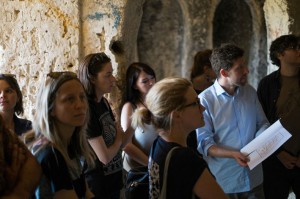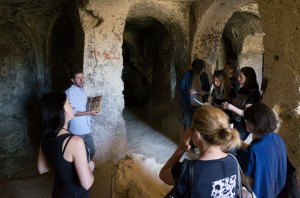Review of the 2015 VESSEL /MADA International Curatorial Retreat, by Dr Alexandra Ross

Review of the 2015 VESSEL /MADA International Curatorial Retreat, by Dr Alexandra Ross

Last month, in the southern Italian city of Bari, VESSEL held the 2015 edition of their International Curatorial Workshop. This iteration was entitled, a ‘retreat’, and drew together practitioners from across the globe with a shared interest in the role of writing as it relates to the curatorial. Informed by issues pertaining to Southern Theory, VESSEL collaborated with MADA (Monash University, Melbourne) to organise and host the series of workshops and surrounding events. The director of the PhD programme in Curatorial Studies at MADA, Tara McDowell, and the VESSEL team (Anna Santomauro, Andrea Vara, Nicoletta Daldanise and Viviana Checchia) collaborated on content creation and participant selection to compose a rich programme that approached curatorial writing from many angles, drawing on some idiosyncratic examples relating to each tutor’s research interests and previous practice. (Image, right: photograph from Bari)
Situated on the coast of the Adriatic Sea, the calibre of participants gathered was remarkable allowing for an exchange of thoughts flowing between tutors and selected participants alike. Selected participants included: Rachel Dedman, Léuli Eshraghi, Sarah Ann Farrar,Rosemary Forde, Maya Mikelsone, Melanie Oliver, Jesse van Oosten, Heidi Rabben,Maayan Sheleff, Joel Stern, Esxter Szakács, Christel Vesters and Holly Williams. Chef, Boris Portnoy punctuated the retreat with locally sourced delights and even woven into the schedule was a trip to the market to explore the cuisine and offerings from the region.
As its launching point, the retreat was inspired by issues relating to peripheral locations and practices with an attention to projects, practitioners and organisations working outwith the more visible nodes of exhibition-making and curatorial writing.
As one of the tutors on the programme, I was privileged to spend time with such an engaged and experienced group. There was inevitable pairing of passions and specialities within the cohort, but quite exceptionally, the whole gathering connected in such a collaborative manner. I would argue this was due to careful use of space and time, allowing the formal sessions to naturally drift into the more informal space of leisurely lunches and walks through the medieval quarter to the next venue, rather than truncate exciting exchanges and cut conversations off just as momentum was gathering.
I led two workshops. The first, ‘An exercise in listening: Attention to the power and fragility of the voice’, provided an opportunity to tune in and focus our ability to not just hear, but to listen. Sitting alongside the written, how can the spoken create meaning and add value to our understanding of the curatorial? Participants were also invited to introduce a 5-10 minute audio selection to the group. Through active listening, the ensuing discussion explored the fragility or strength of the voice, the vulnerability of the spoken and its recording, and editing and fidelity to the context. This session was an experiment with “truth,” vulnerability, and boundaries.
The second workshop was entitled, ‘Reading between the lines: An exercise in close reading’. Within the field of the curatorial, there is a growing body of writing contextualising and naming both the practice and field.
‘… if a text should be discovered in a state of anonymity – whether as a consequence of an accident or the author’s explicitly wish – the game becomes one of rediscovering the author. Since literary anonymity is not tolerable, we can accept it only in the guise of an enigma. As a result, the author function today plays an important role in our view of literary works.’
Michel Foucault, 1998, ‘Aesthetics, Method, and Epistemology’, Edited by James D. Faubion, translated by Robert, Hurley and others: p.213

In an attempt to subvert the conventional process of reading texts on the curatorial, we examined writing that represents a greater polyphony of voices, thereby challenging assumptions of institutional or authorial hegemony. Excerpts from selected texts were presented to the group. Disrupting the normal process of reading and evaluating texts through triggers such as author, date, publisher, translator or editorial names and preface, this workshop allowed a rare opportunity for close reading of pages removed from their context. An intentionally diverse grouping of texts was chosen in order that the group consider the author’s voice, to whom is it speaking, and in what era. (Photograph above – Close Reading workshop, shot by Piero Percoco)
Other tutors included: Fucking Good Art, whose workshop took place in nearby Monopoli, and during which there was an exchange of ideas about “monopolies” in art. The premise came from a conversation with Cesare Pietroiusti in FGA’s Italian Issue: “The art world is about monopolies, and the more things are visible the more things will be hidden, invisible.” This subject is central to FGA, which is about the importance of (art) networks as an antidote to the mainstream ruled by market and bourgeois taste.
Latitudes, an independent curatorial office initiated in April 2005 by Max Andrews and Mariana Cánepa Luna, works in an international context from and in Barcelona, Spain. Their workshop ‘Near-future artworlds curatorial disruption foresight group’ explored how tomorrow’s exhibition and art institutions might be, or should be, undergoing similar transformations. They posed a series of questions including: Should exhibitions embrace or resist becoming smarter? Would these new relationships demand a far richer interpretation of art writing that includes fiction or “non-creative” writing, or necessitate a far simpler one that caters for edutainment? Why do we still primarily experience art through the formula of exhibition+catalogue and with the standardized textual accoutrements of press release, wall labels, curator’s essay, and critic’s review?
A workshop took place in a hypogeum and was led by Vit Havranek of Tranzit (see images below, shot by Piero Percoco). The workshop: ‘Thinking about display in a cave’, proposed to go to nature, not as a romantic escape, but as a retreat from stereotypes of the workshop. As proposed by Vit, the site, the cave, was a vanishing point of phantasms. It’s a prototype of a Stone Age civilization shelter, and where the earth’s oldest drawings, precursors of what today we call art, are found. Here curating was thought and enacted as micropolitics. A curator may begin from a theoretical, speculative, activist, or phenomenological impulse. Further, Vit proposed that if the curator doesn’t apply his or her own hypothesis self-reflexively and on the institution, the public articulation of these theories can lack coherency.


The final workshop, ‘Plausible Deniabilities’ was led by the curator of the Riwaq Biennial, Tirdad Zolghadr and was a workshop on curatorial prose as we know it, within biennale contexts and beyond. Amusingly and provocatively he posed the questions: Are curators really such bad writers? If so, why is that? If not, where exactly does the nasty reputation come from? And how is all this shifting with the ferocious internationalism of our “post-internet” context? The workshop traced some fundamental orthodoxies pertaining to art writing in general.
Hospitality abounded making the free exchange of ideas flow candidly throughout the days and into the nights. It is no wonder that there have been several collaborations initiated since the official closure of the event. Several of us have formed an informal writing group covering five coastal locations worldwide in order to ensure this exchange continues to drift between Christchurch, Beirut, San Francisco, Melbourne and Cape Town.
Further information:
Vessel is a platform for the development of a critical discourse related to cultural, social, economic and political processes taking place in the South of Italy and in the Euro-Mediterranean area. Vessel is interested in exploring socially engaged practices in relation to their context of emergence, to their geographies and psychogeographies, to their imbrication into fixed political ideologies; Vessel investigates how social imagination could be enhanced and how its concrete products could articulate strategies of critical resistance against the current dominant representation.
Launched in March 2014, the Curatorial Practice Program at MADA plans to develop as an international centre for curatorial models that reflect critically on how we engage with our cultures, our cities, and our world. It fosters curatorial projects that test the limits of arts institutions. It supports advanced scholarly work on exhibitions and their histories, conditions of art’s public appearance, and the politics of display. The program nurtures spaces of retreat to allow forms of research other than those that normally occur within the framework of educational institutions.